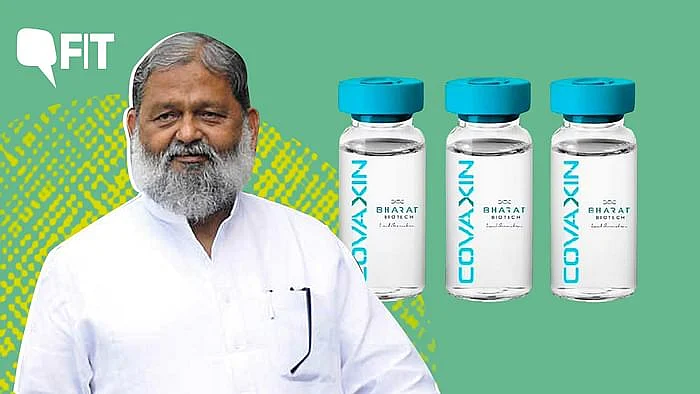
Anil Vij Tests COVID Positive; But Questioning Covaxin is Baseless
Reaching such conclusions based on his diagnosis would be premature for multiple reasons. We break it down for you.

advertisement
Haryana Health Minister Anil Vij on Saturday, 5 December, took to Twitter to announce that he had tested positive for COVID-19 and was admitted in Civil Hospital Ambala Cantonment.
On 20 November, Vij had taken part in the phase-3 trial of India’s first indigenous vaccine candidate, Covaxin, being developed by Bharat Biotech along with the Indian Council of Medical Research, at the Civil Hospital at Ambala Cantonment.
But reaching such conclusions based on his diagnosis would be premature for multiple reasons. We break these down for you.
1. Double-Blinded and Randomised Controlled Trial
The phase 3 trials being carried out by Bharat Biotech for Covaxin are double-blinded and randomised, where 50 percent of the subjects will receive the vaccine and 50 percent of the subjects will receive placebo, the company has said in a statement.
This means that we cannot know which participant receives what – and the same stands true for Vij. There’s an equal likelihood that he was administered a placebo instead of the Covaxin dose.
In conversation with FIT, Dr Anant Bhan, Adjunct Professor & Researcher in Bioethics at Mangaluru’s Yenepoya University, reiterated the same point, “We do not know if he was in the intervention or control group. We cannot make an inference on the vaccine efficacy just yet.”
2. Covaxin Trial Is Based on a Two-Dose Regimen
The company has also clarified that the clinical trials are based on a two-dose schedule, given 28 days apart.
Haryana Health Minister Anil Vij has only received the first dose. He would still have a second dose pending as part of the trial.
3. Antibodies Take Time to Build-up
Bharat Biotech has highlighted that the vaccine efficacy can only be determined 14 days post the second dose. Antibodies against the virus take time to build up and act.
The Union Health Ministry also clarified, “The antibodies against the infection build up in a human being only after a specific number of days pass, after the second dose of the vaccine is taken. The minister in question has taken only one dose of the vaccine.”
The phase-3 trials for Covaxin are being conducted across 25 centres in the country on 26,000 people. According to officials at the National Institute of Cholera and Enteric Diseases (ICMR-NICED) in Kolkata, the results will be available in November 2021, Hindustan Times reported. The interim report may be available by May 2021 at the earliest, they added.
(This article was first published on FIT and has been republished with permission.)
(At The Quint, we question everything. Play an active role in shaping our journalism by becoming a member today.)
- Access to all paywalled content on site
- Ad-free experience across The Quint
- Early previews of our Special Projects
Published: undefined